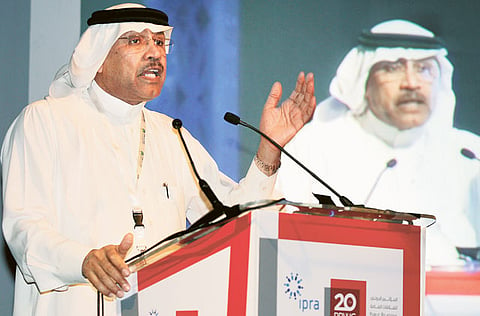PR industry urged to listen to the youth, learn from Arab Spring
Specialists attend the 20th Public Relations World Congress held in Dubai Wednesday

Dubai The regional communications industry must listen and include the voice of the Arab youth, industry specialists said at the 20th Public Relations World Congress (PRWC) Wednesday.
To match the changes in the political and cultural landscape following the recent uprising across the Arab region, communication specialists should look towards the young population, said Abdallah S Juma, former president and CEO of Saudi Arabian Oil Company (Saudi Aramco)
The PR industry is relatively new in the Arab world, however, it has come a long way since it was established in the early 2000s, he said.
"By 2009, barely a decade after the profession first became institutionalised here, total fee revenues reached approximately $150 million (Dh550.8 million).
"Today, the overall value of the industry, including work done by in-house communications departments, stands at about $500 million. If current trends continue, there is every reason to believe that the industry will be worth $1 billion annually within a decade. I think that the Arab Spring, despite the short-term challenges it is posing, will accelerate those growth prospects for the industry in the medium and longer term," said Sunil John, congress chairman and member of the Global Board of IPRA and CEO of ASDA'A Burston Marsteller, UAE.
Empowering the youth
As the industry develops so will expectations. Dr Tarek Yousuf, CEO of Silatech, Qatar, said the expectations of young people are also high. According to Yousuf, the Arab Spring has been about achieving the goals, aspirations and dreams of a youth generation in the Arab world who have felt left out. The challenge now from a communications and public relations arena is to engage them.
"We should be paying greater attention from a PR and communications perspective by investing resources and energies in trying to understand this. It is true that these protests were led by young people. This will be paramount to shaping some of the discourses the youth have attached themselves to. That is what we see in a number of countries across the Arab world — they are preoccupied with the challenges of empowering the Arab youth. The empowerment is integrating the youth in the new political arena. How? Most youths still organised along protest movement have very little exposure to the formal political arena. The countries that are going through change are going to have a difficult time managing these voices," said Dr Yousuf. One of the main tools that has been harnessed by the youth of the region during the events of the last year is social media.
According to Faisal Al Zahrani, president IPRA Gulf Chapter Saudi Arabia, it's a powerful tool that cannot be ignored. In order to harness it, the communications industry needs to understand its advantages as well as its pitfalls.
‘Interactivity'
"The use of social media adds another level of difficulty to those we already face in our profession as public relations practitioners. Social media is excellent for measuring trends and group dynamics and it serves as an outlet for people in difficult situations, plus there is a major element of interactivity. For individuals who want interactive communications, it can be great but for businesses and governments there are serious issues that need to be addressed. In fact it is up to PR professionals to understand the pitfalls because we are the information representatives of our clients. And that is why I stress the need for both professionalism and strong communications fundamentals in our approach to all aspects of our work," said Al Zahrani.
"Solid skills must go hand in hand with the mastery of social media. Social media spreads rumours far more effectively than other tools. We must know how to distinguish fact from fallacy and your clients will depend on you to do that. Everything has a cause and effect. Our job is to ensure the effect for our clients is always positive," he added.
Reem Al Hashemi, UAE Minister of State, pointed out in her opening speech that the UAE has been utilising these new channels. "Now we are very close, more than before. Technology has given us unlimited channels in order to communicate," she said.
Sign up for the Daily Briefing
Get the latest news and updates straight to your inbox


